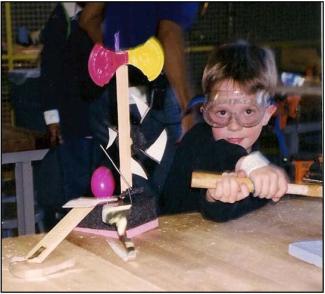
Don’t STEM the Tide of Curiosity
December 13, 2013
The future economic viability of our country relies on a STEM-literate citizenry and workforce, but we aren’t educating our children to be science, technology, engineering, and math (STEM) literate. Research evidence is mounting for the importance of math and science school readiness for long-term achievement in these areas and in reading; yet, we leave behind so many children from low-resource communities. Children who are as curious, able, and eager to learn as their middle class peers arrive at school behind in math and science knowledge and skills. These gaps are likely to widen during the school years.

Used with permission of Kimberly Brenneman.
We have to change the equation here. It’s not just an economic imperative; it’s a moral one. Our challenge is to provide children with the kinds of home and preschool experiences that are good bets to improve school readiness in math and science. Last week I returned from my fourth professional meeting in as many weeks. Despite logging thousands of miles on United and Amtrak; spending nearly as many nights at the Marriott as in my own bed; and nearly being buried under the resulting blizzard of receipts and reimbursement forms, I am more enthusiastic and energetic about the field than I’ve been in years…maybe ever. At every one of those meetings I met, spoke to, learned from, and collaborated with people who share my passion for early childhood science, technology, engineering, and math education and are prepared to accept the challenge of improving early STEM readiness.
It is particularly satisfying to see the variety of groups interested in this issue. The Heising-Simons Foundation convened a group of researchers and funders to discuss ways to improve family engagement in children’s early math learning. At the National Governor’s Association meeting, policymakers and researchers brainstormed ways to bring early math to the forefront of education policy. Colleagues and I gave presentations to hundreds of educators at the National Association for the Education of Young Children, each of whom wanted to improve their professional skills so that they could better support young children as science learners. At the National Science Foundation’s December 3 STEM Smart meeting, focused on early education, 300 researchers, teachers, education administrators, policymakers, funders, and business people came together to further our knowledge about early childhood STEM learning and teaching. The waiting list had 150 more names on it. I even tried my hand at Twitter for the first time so I could participate in a TweetChat on improving STEM outreach in early childhood education, organized by PreschoolNation. How can I not be energized by this shared will and desire to do the hard work of figuring out how to harness our knowledge, enthusiasm, and unique perspectives to make progress?
It won’t be easy. It’s going to require a great deal of will, a great deal of working together, and a great deal of funding to meet the challenge of providing solid supports for STEM learning for every child. Given the economics of early education, high quality programs in preschool are a good bet to yield a high return on investment, so that these young kids stay in the STEM pipeline and get the high paying STEM jobs. And that’s important. The military, the tech industry, medicine, engineering, and many other fields require a highly skilled workforce. But before we get to that, we’ve got hundreds of thousands of preschool children who are not only eager to learn, but also eager to learn science, technology, engineering, and math. I know I don’t want to lose even one of them because we adults–who had the opportunity and responsibility to improve science education–didn’t work together or try hard enough. After the last few weeks, I know I am far from alone in my determination to take up the challenge.
– Kimberly Brenneman, Assistant Research Professor, NIEER
About NIEER
The National Institute for Early Education Research (NIEER) at the Graduate School of Education, Rutgers University, New Brunswick, NJ, conducts and disseminates independent research and analysis to inform early childhood education policy.
